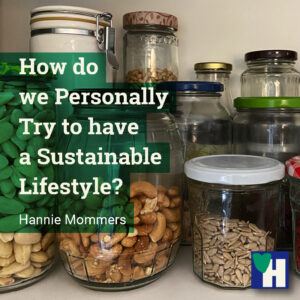
In the article Easy Sustainable Living Ideas – Pick 1 or 2 and Start Living Green, I have listed other things Tom and I could do to try to have a sustainable lifestyle. For now, I’ll write down what we do at the moment. Let’s call it the baseline measurement.
Whenever I read articles from others who have a zero-waste or a sustainable lifestyle, I have the impression we don’t give it enough effort. But then I recite my favorite quote in my head: “We don’t need a few people who do everything right but a lot of people who do some things well”.
When we still lived in the Netherlands it was easier to comply with our conditions. Spain seems less aware of the environment. Well, that means we have to put in more effort, but not that it is impossible.
So let’s dive into how we try to have a sustainable lifestyle. And please tell us any improvements or additional remarks you have. We are constantly trying to learn and adjust. 🙂
Table of contents
Try to have a sustainable lifestyle

People who live sustainably try to reduce natural and personal resources.
Now that I discover the difficulties that can arise to live sustainably, I am more aware that there is a difference between wanting something and being able to. I am also better able to judge when arguments make sense, and when they are excuses for unwillingness.
Personally, I prefer people to say honestly that they don’t feel like making an effort than to give silly excuses. We can’t leave change to the governments and the industry. Fortunately, many people do want to try to make a difference. As we say in the Netherlands: every little bit helps.
(The saying goes in full: Every little bit helps, the woman said and she peed in the sea!) 🙂
Not just the environment
Sustainability goes a long way. It’s not just the earth we need to take care of. Other areas are our health, relationships, travel, work, and hobbies. Produce without pesticides, herbicides, and fungicides is not just better for the earth but also for our health.
If you do your errands by bicycle or on foot, you’re not only saving fuel but are working on your health through exercise as well. I can’t tell you how much I miss my bike! In the Netherlands, I cycled all the time.
Over here I still haven’t gathered the courage to buy a bike, because – in my opinion – the Spanish drivers are a danger on the road. OK, back to what we actually do at the moment.
Shopping ecologically

1. Our organic vegetables come from a couple of local ecological shops and a supermarket that has a section of organic produce;
2. Just once a week we eat poultry or fish;
3. The poultry and smoked salmon are organic, the other fish isn’t;
4. We refuse single-use-plastic as much as possible;
5. When we shop, we use our own bags and boxes;
6. Crocheted cotton nets for the fruit;
7. Reuse of paper bags for vegetables, seeds, and nuts;
8. Glass containers (with a plastic lid for hygienic reasons) for the fish from the market.
Responsible water consumption
9. Bucket in the sink for collecting excess water;
10. Waterfilter, even on vacation.
Taking care of the soil
11. Vegetables and fruits from our own garden;
12. Kitchen garden without poison;
13. Cutting the hedge with the hedge trimmer by hand, instead of a noisy electric device;
14. Composting.
Related: Organic Companion Planting for a Healthy Kitchen Garden
Work and hobbies
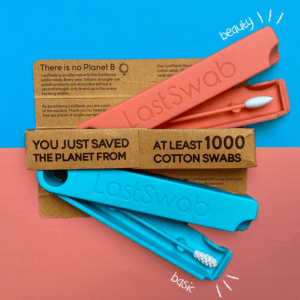
15. Printing paper on both sides;
16. Making my own glue from wallpaper paste and wood glue;
17. Reading the newspapers on the computer;
18. Reading books on an e-reader;
19. Working from home as bloggers and affiliate marketers.
Related: Kobo E-reader Review – Always your Bookcase at Hand
In the house
20. Separating waste. The bins for this are far away, so the consequence is that we have to take the car to take the waste away;
21. Glass jars for our stock of nuts, seeds, herbs;
22. Metal strainer for the tea;
23. Bamboo straws for the grandchildren;
24. No light in spaces where we are not present;
25. Energy-saving lamps with motion sensors in de bathrooms;
26. 1 Watt LED lamps in the corridors;
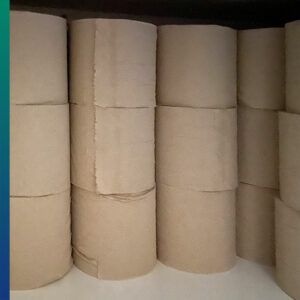
27. Turning on the heating only when it gets really cold, not automatically;
28. No chlorine;
29. Solar panels on the roof;
30. Toilet paper of recycled paper, bought in bulk, packed in a cardboard box;
31. Refill detergent for laundry and dishes in glass bottles in eco-shop;
32. Washing at low temperature;
33. Using the dryer only when it rains;
34. Collecting peels, tea, and coffee drab for the compost heap.
Related: How to Start Organic Composting at Home Immediately
Travel
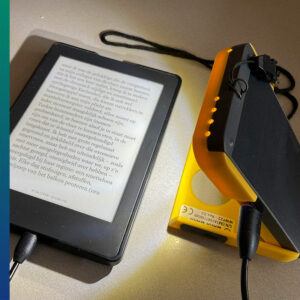
35. Avoiding flying;
36. Bringing the water filter with us;
37. A solar lamp on the Waka Waka, which also has a USB port to load the e-readers. It doesn’t have enough capacity to load our phones, that’s a pity;
38. Garbage in, garbage out in nature parks;
39. Glass bottles with a silicone jacket, so they won’t break and to keep the water cool.
Related: How to Design Your Sustainable Travel Plan Successfully
Personal care of the body
40. No make-up. I have to admit this was an easy decision because I am allergic to most make-up;
41. Cotton handkerchiefs;
42. No plastic clothing;
43. Wooden toothbrush;
44. Bar of soap instead of a bottle of shower gel;
45. Homemade toothpaste in the summer. The coconut oil hardens too much to my liking in wintertime.
A matter of choice?
I guess it is too easy to say that a sustainable lifestyle is just a matter of choice. There is no black or white. Several factors will influence whether you have a choice or not.
For instance: we hardly ever use the dryer, because it doesn’t often rain where we live. In the Netherlands, it would be the other way around. Lots of rain so often using the dryer.
Another example: we work but we don’t have to because we are retired. So we have time to go to different shops, to garden, and to cook fresh food. If you have a family of 4, both parents working and the children still young, it’s a much bigger challenge to do that.
One step at a time
Like I said in the beginning, if everyone would do a little, we will go a long way. My next step will probably be: getting over my fear of cycling over here and buying a bicycle. Or, fill the watering can with the shower water while it is warming up.
Do you have more suggestions for us? Let us know in the comment box below.
Some of the links are affiliate links. As an affiliate associate, we earn a commission when you purchase any of the products offered through the shared links at no extra cost for you. This helps us maintain this website.


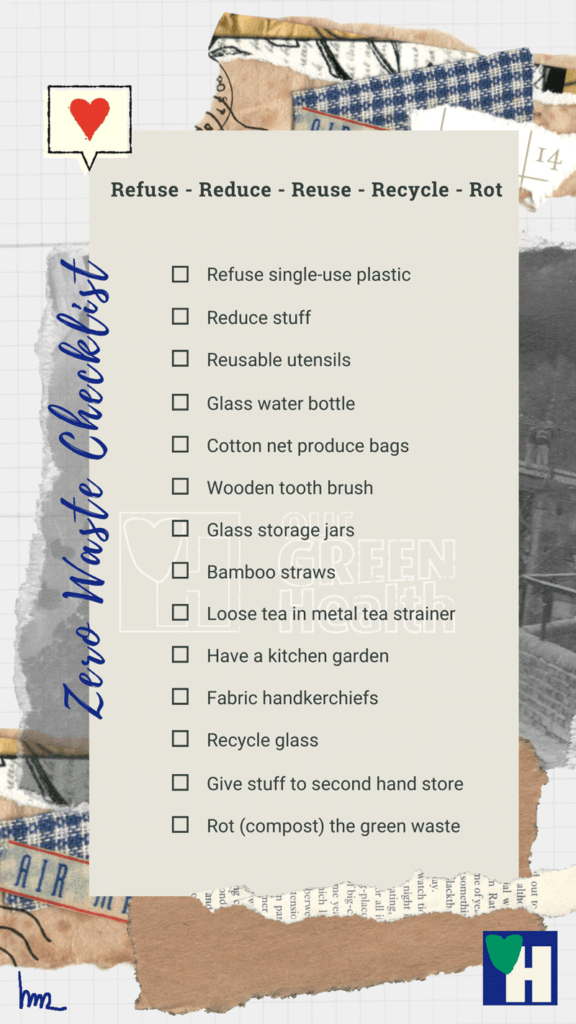
Wow! What a great article.
You really are doing a lot to live sustainably.
As I read down your list I was surprised to see how many of those things we are also doing although my list is considerably shorter than yours.
We have solar evacuated tubes on our house roof that supplies domestic hot water and in-floor heating in the winter. We also have photo-voltaic panels on the garage for power. While it is not yet enough for all our needs it does cut down substantially on how much we use from the grid.
We grow our own vegetables in summer and are currently looking into ways to grow year-round, which could be tricky here in Canada.
Recycling is something we have always done even before it was “a thing”.
When I must buy produce, I buy local organic as much as possible.
Because we live in a rural community we must use a car to buy groceries but we do limit our trips to once every 2 weeks and try to do all errands in one trip.
There are lots of other ways we are making sustainable choices but we still have a long ways to go before we catch up to what we are doing.
I also don’t wear makeup unless dressing for an occasion then I choose natural products that do not use animal testing or ingredients, tricky in today’s world.
Your article really got me thinking though so thank you for that. I love learning other ways to live more sustainably. I will be tuning in for more advice.
Thanks so much, Deb, both for the compliment as for your very useful tips! It’s amazing, isn’t it, how much we do without even noticing ourselves. Just by living consciously, we go a long way. 🙂
The in-floor heating sounds marvelous to me. Does it produce enough warmth for the nights? Or do you also have a battery to store the energy of the day?
I am writing a second article, with even more tips, so yes please, do come back. It’s so great to inspire each other in this area. 🙂
I think living consciously is the key that people need so that they become more aware of of the impact our activities are having on the environment.
You are right when you say that our governments and industry are not going to make the changes. Both focus on money, and while consumers are still buying products that harm the environment, industry will still keep producing them and governments will still collect money from the whole process.
People need to wake up to the fact that we only have one earth. With this realization they must understand that the more we destroy the soils and ecosystems, the less pleasant life will be for their children and grandchildren.
Many people doing a few things would be a great beginning, but it is only a beginning.
I think significant change is going to necessitate a change away from our consumerism societies into an understanding that we are part of the world and all of her natural systems, and we need to look after her so that we can have rewarding and fulfilling lives.
Thanks for doing all that you do 🙂
I wish you well,
Andrew
Precisely, Andrew, there is no planet B. And you are right, it would be only a beginning if everyone would do a little bit. But you know what? Once someone starts taking the first small step, there is no stopping. If a goal is set too high, chances are someone gets frustrated and quits. But small steps are manageable and inspiring.
I see it by observing my son. He got inspired by the way we are living, yet didn’t see in the beginning how he could do the same. Now that he has been able to take a first small step by buying a Brita filter and quitting the bottled water, he continued by exploring the markets in his neighborhood to buy goods that are not in plastic.
Additionally, it appears that shopping at the markets instead of in the supermarket brings more fun to the shopping because the sellers are recognizing him and giving him something extra at times. And they talk a lot about their products because that is what people do when they are enthusiastic, so both he and the grandkids learn a lot about the produce. It’s magnificent. 🙂
Thanks for stopping by, Andrew, and all the best for you too.
Hi, I was interested in a sustainable lifestyle when I discovered your website. I loved it more, and now reading this article, I better understand this lifestyle. I appreciate how you explained it very well.
I started by using the dryer only when it rains and stop purchasing unnecessary things at home, I also use soap regularly and don’t buy shower gels anymore. I’m proud of myself.
Yes, very good of you, Rose. I would be proud of myself as well. And you’ll see, once you start being interested in living more sustainably, you’ll notice other things to do as well along the way.
Especially stop purchasing unnecessary things is a very good decision. Not only do you save the planet that way, but your wallet will be grateful as well. I do wish more people would follow your example.
Coincidentally I was telling a friend this afternoon about the daughters of another friend who buy clothes every week. And when they clear up their cupboards at the end of the season, they discover all the items they didn’t even wear, still new. But they ‘must’ be given away, because next season those clothes will be out of fashion. Such a waste.
Thanks for your reaction and keep up the good works. 🙂
Congratulations on such a great article. You’re really giving your best to live a sustainable life. And I have to admit that there’s a ton of little things you mentioned that I didn’t even pay attention to them, and I’ll have to.
Even though it’s a very important topic, I think it’s hard for everyone to adapt their lives completely. I’ll take my country for instance: the average salary is about 700 euros. People are living from paycheck to paycheck. As long as the situation is like that, I don’t think anyone cares about sustainability and the environment. I hope that you know what I want to say. Nobody will buy solar panels when they already lack the money.
However, there are always some little changes we can make. You mentioned some of them: wooden toothbrushes, composting, reading the newspaper on the computer, etc. What do you think about that? How to make life sustainable in “poorer” countries? How to make people take care of the earth and themselves when they have economic problems and their most important task is to have enough money until next paycheck.
I hope I didn’t dive too deep into this hehe 🙂
Yes, Petar, I understand completely what you say. When people are worried about where their next meal has to come from, of course they are not occupied with the environment.
Although I usually find it’s everyone’s personal responsibility to take care of things and that we shouldn’t leave too much in the hands of governments, in this case, there is a lot governments can do. They can install solar panels so that their population can benefit from them.
The governments could also create the conditions for cradle-to-cradle companies and a circular economy. The architect Thomas Rau has some great ideas on how to realize that in a way poor people could benefit hugely from. You gave me the inspiration to make an article about that! Thanks!
In general, rich people are more of a problem than poor people. The rich are the ones that throw away everything they don’t fancy anymore, where the poor wear their clothes until they’re turned into rags. It will turn into a problem when people only desire to be a part of the consumption society as well because there is too much waste already. We don’t need more.
Thanks for your reaction and take care!